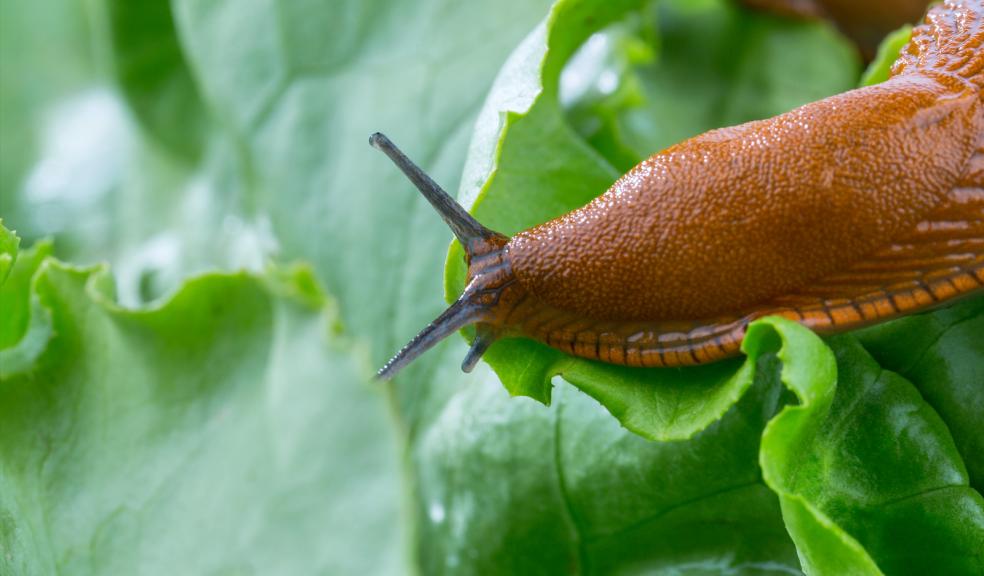
Gardeners beware! 2016 heralds the year of the Sleepless Superslug
Wyevale Garden Centres is warning the gardeners of Britain to prepare for an increase of supersized slugs this spring, thanks to our unseasonably mild winter.
Due to a change in recent weather patterns and a lack of hard frost, our slug population is booming. Unlike snails, slugs are active above 5°c and Britain’s mild winter means they’ve been awake for a longer season than usual and therefore able to reproduce all winter – at a much faster rate than usual – the result of which is a population explosion. As these sleepless slugs are laying between 20 and 100 eggs a time, one cubic metre of garden could contain up to 200 slugs, with the average UK garden home to up to 20,000. The number isn’t the only problem – mild weather also means a better food supply and with the lack of sleep meaning more time to eat, they are bigger than ever before.
Duncan McLean, Buyer for Growing Media and Garden Nourish & Control at Wyevale Garden Centres says, “Thanks to another unseasonably wet and mild winter with few hard frosts, our slugs simply haven’t hibernated as they usually do. They’re grazing constantly on prematurely budding plants, getting larger and larger in the process (up to 40 times their body weight), whilst also having the time to breed more, adding to existing colonies and spelling disaster for our gardens.”
He added; “We are always looking for new, innovative and effective products. This year we have a new, first to market product exclusive to Wyevale Garden Centres, Sluggo Slug and Snail Killer Ultra, which is twice as potent as the current ferric phosphate pellet. It is biodegradable and will not harm children, pets or wildlife when used as directed, it contains ferric phosphate, an active ingredient occurring in nature which biodegrades into Iron and phosphate benefitting the soil. We also advise on other management methods including the re-siting of slugs in non residential areas at a distance from your garden.”
Wyevale Garden Centres has noticed a 33% increase in sales year on year in the sale of ‘friendly’ slug and snail deterrents, such as slug wool and ferric phosphate products. The growth in early season purchase also indicates that gardeners are becoming better prepared; after all, prevention is better than cure.
Matt Shardlow, CEO of Buglife commented on the issue, ‘Due to climate shifts, warmer winters and wetter summers, we’re seeing slugs become active all year round, whereas key predators like amphibians will only lay their eggs once year slugs are not so restricted. Coupled with the fact that general slug varieties are also reaching full size earlier than ever, gardeners are simply not getting any respite and need innovative management solutions.’
The impact of super-sized, sleepless slugs could spell devastation for our gardens this summer. We know these slugs eat everything, but to avoid having all your buds eaten alive before they’ve a chance to flourish, here a few plants that they really don’t like:
Bergenia (elephant’s ears)
Aquilegia species
Euphorbia species
Geranium species
Digitalis purpurea (foxglove)
Alchmilla mollis (lady’s mantle)
Agapanthus
Fuchsia
Astrantia major
Dicentra spectabilis (bleeding heart)
Anemone hupehensis (Japanese anemone)
"Slugs and snails are some of the most annoying creatures for any gardener, but with some determination and ingenuity it is possible to outwit them," says keen gardener and garden designer Jane Ashley, of Jane Ashley Garden Design.
"Not only do they destroy your plants, they also destroy all the valuable time and effort you’ve put into growing and nurturing them. For many years I avoided growing plants like dahlias, hostas and delphiniums and instead grew plants the nuisances didn’t like - perennials such as astrantias, euphorbias, geraniums, persicarias, sanguisorbias and echinops. Last year however I really wanted to try dahlias again and I actually found barriers worked fairly well to protect them. I used grit and slug-repelling wool pellets and was delighted to manage a good flower display by late summer."
Wyevale Garden Centres has put together some tips for slug management:
Prevention is the recommended plan of attack; don’t wait until it’s too late - get the slugs before they get your plants! Our next generation slug pellet is Sluggo Slug & Snail Ultra pellets cover twice the area as traditional pellets and should be used regularly and sparingly around the garden as plants start to break dormancy. Slugs are naturally attracted to the pellets and prefer them to your fresh young plants.
Whilst gardeners can humanely remove native British slugs by releasing them into the wild, experts warn to be careful not to do the same with Spanish Slugs as they could have a potentially damaging effect on the environment they are released into.
Gardeners should encourage natural predators such as birds and hedgehogs into their garden – helping to keep their slug infestation down as well as helping to protect native British wildlife.
Wyevale Garden Centres also stock the innovative Vitax Slug Gone pellets made from wool, which, when wet forms a continuous mat around plants which acts as a barrier to control damage. It is accredited by the Soil Association and is a firm favourite with organic and environmentally conscious gardeners. Slug Gone also helps plants grow, enabling them to better retain moisture as well as containing naturally occurring slow release nutrients.
Try making a simple garlic spray to ward them off: Boil a garlic bulb in two pints of water, then leave to cool. Apply to the garden with a watering can in early spring if possible, or in summer. If applied in summer solution works for 4-5 weeks before reapplication is needed.
To stem the slug epidemic, gardeners can use Wyevale Garden Centres’ 5 STEP ALL YEAR ROUND management plan to protect their gardens:-
- Regularly stock up on your preferred supplies
- Continually look for young slugs. Put out your slug pellets or surround vulnerable plants with material such as sharp grit or broken egg shells making it too uncomfortable for slugs to attack your plants
- Rotovate your soil to expose slugs and eggs to predators such as hedgehogs and garden birds
- Continue with night hunts armed with a torch and place any you find in a bucket of soapy water (the soap prevents them from climbing back out!) or re-site in non residential areas away from the house
- Protect plants in pots by greasing the rim with Vaseline mixed with salt or by setting beer traps. Salt dehydrates slugs while they find beer irresistible. Don’t forget to empty the beer traps though!













